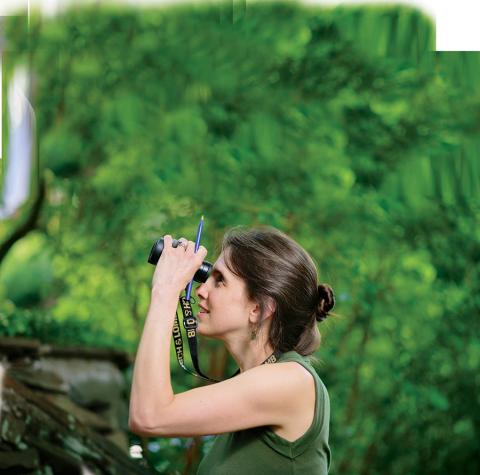On the Front Lines
A 2001 alumna's Bryn Mawr experience prepared her for conservation work in the Amazon.
Maybe you’ve heard the song “Jungle Love.” Hannah Stutzman ’01 lived it. “I got engaged in the Amazon. My now-husband … was bringing this engagement ring with him expecting that we would be alone at some point. That day we hiked like 12 miles in 90-degree heat. I almost passed out from dehydration. The only time we were alone was after dinner in kind of a little river where the pigs and the chickens walk through, and I guess he saw his moment. In the dark, in the mud, in our little stream.”
That was in 2014, the same year Stutzman became executive director of the Amazon Conservation Association (ACA), an 18-year-old nonprofit that works to protect and conserve biodiversity in the world’s largest rainforest.
The Amazon region is home to more than 2,500 species of animals and 40,000 plant species as well as nearly 400 indigenous groups. The rainforest is critical to climate change because it absorbs huge quantities of carbon dioxide, the main greenhouse gas. But vast tracts have been lost to agriculture, cattle grazing, logging, gold mining, and other harmful practices.
Stutzman’s organization works to create protected conservation areas and plants tens of thousands of trees every year. It provides technical support and market connections to Brazil nut harvesters and farmers by offering them incentives to employ forest-friendly methods. It also oversees three research stations that host scientists and students.
The ACA has helped protect more than 3.8 million acres in southeastern Peru and northern Bolivia, an area stretching from high in the Andes down to the lowland basin of the rainforest. It’s a region particularly rich in plants and animals that may provide them relief from a warming planet. “Having forests and preserved ecosystems across the mountain gradient is expected to offer kind of a refuge for species as they move up the slope (where it is cooler) as the climate around them is changing,” Stutzman says.
She and the ACA are based in Washington, D.C., but the organization has partnerships with conservation groups in Peru and Bolivia. All but eight of its 100-plus employees are in those two countries.
Stutzman’s career path seems almost inevitable. Her father was an anthropology professor at Goshen College, a Mennonite liberal arts school in Indiana. His research took him to Ecuador, and especially Central America. When she was two, the family lived in Costa Rica for a year and again from ages nine through 11. She became bilingual early on.
“I think I always was interested in travel and other places and other cultures, especially in Latin America, just because of my family background,” Stutzman says.
An anthropology major at Bryn Mawr, she earned her master’s from Yale’s School of Forestry and Environmental Studies. She moved to Bogota, Colombia, for four years, working much of that time for Conservation International. Then it was off to Washington, D.C., where she assessed the effects of tourism on World Heritage sites for the United Nations Foundation. She joined the ACA in 2010 as a program manager.
“At Bryn Mawr I studied anthropology, but I had a lot of opportunities to do some field-focused biology studies,” Stutzman says. “It was really informative for me. I think the ability at Bryn Mawr to combine environmental field science with anthropology was what allowed me to put it together, both the conservation side and the human side.”
Stutzman faces long odds in trying to protect the Amazon. The ACA predicts that at current rates of degradation, half of the rainforest may be destroyed or severely damaged by 2030. Is she fighting a futile battle?
“We wouldn’t be doing this if we didn’t have hope,” she says. “Part of it for us is working with those folks who are on the ground, day-to-day, at the real front lines of conservation. I think it’s our responsibility to support them with resources, technical support—everything we can do. For me, that’s a big part of the inspiration.”
Published on: 09/14/2017
